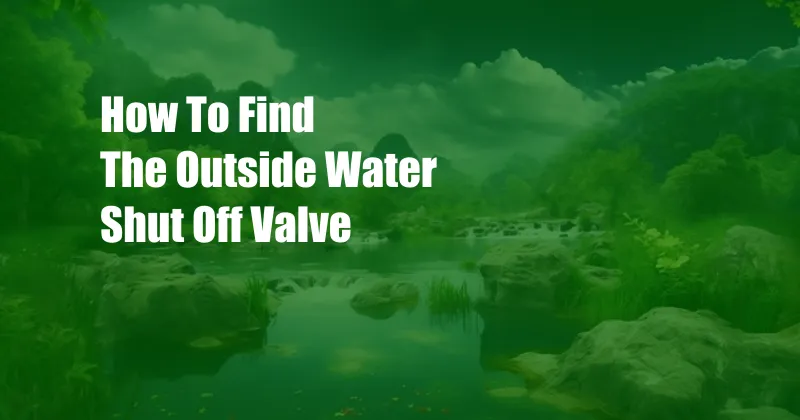
How to Find the Outside Water Shut-Off Valve: A Comprehensive Guide
Water is an indispensable part of our lives. It’s hard to imagine our daily routines without access to fresh, clean water for drinking, cleaning, and sanitation. As homeowners, it’s essential to know how to control the water supply to our homes, especially in case of emergencies.
The outside water shut-off valve is a crucial component of any home’s plumbing system. This valve allows you to turn off the water supply to your entire house, making it essential for repairs, maintenance, and emergencies. Knowing where the outside water shut-off valve is located and how to use it can save you time, money, and potential damage to your home.
Understanding Your Water Shut-Off Valve
The outside water shut-off valve is a ball valve typically made of brass or plastic. It’s usually located near the street or driveway where the water main enters your property. The valve is designed to be turned off by hand, although some newer models may require a wrench.
It’s important to note that the outside water shut-off valve only controls the water supply to your house. It does not affect the water supply to any other properties on your street or neighborhood.
Finding Your Outside Water Shut-Off Valve
- Check near the Street or Driveway: The most common location for the outside water shut-off valve is near the street or driveway where the water main enters your property. Look for a small, round or square-shaped metal or plastic box, typically green or blue in color.
- Inspect the Side of Your House: Occasionally, the outside water shut-off valve may be located on the side of your house, usually near the front or back. Check for a similar metal or plastic box or a small, round cap that can be turned with a wrench.
- Use a Metal Detector: If you’re still having trouble finding the outside water shut-off valve, you can try using a metal detector. Most valves are made of metal, so a metal detector can help you locate the buried valve.
Turning Off the Water Supply
- Locate the Valve: Once you’ve found the outside water shut-off valve, remove the protective cap or cover.
- Turn the Valve: Most outside water shut-off valves are ball valves. To turn off the water supply, simply turn the valve clockwise until it stops. If the valve is a gate valve, turn the handle clockwise until it’s perpendicular to the pipe.
- Test the Valve: After turning off the valve, go inside your house and check if the water has stopped flowing. If the water is still running, the valve may not be closed properly. Turn the valve a little tighter or adjust the gate valve handle as needed.
Tips and Expert Advice
- It’s a good idea to familiarize yourself with the location and operation of your outside water shut-off valve before an emergency arises.
- Keep the area around the outside water shut-off valve clear of debris and vegetation.
- If you’re having trouble turning off the water supply, call a licensed plumber for assistance.
- If your outside water shut-off valve is old or damaged, it’s important to replace it immediately.
- In areas with freezing temperatures, make sure the outside water shut-off valve is well-insulated to prevent freezing and damage.
FAQ
Q: Why is it important to know where the outside water shut-off valve is?
A: Knowing where the outside water shut-off valve is located is crucial in case of emergencies, such as a burst pipe or a broken appliance that’s leaking water. It allows you to turn off the water supply to your house quickly, preventing further damage.
Q: What are the signs that my outside water shut-off valve needs to be replaced?
A: Some signs that your outside water shut-off valve may need to be replaced include difficulty turning the valve, leakage, or visible damage to the valve or its handle.
Conclusion
Finding the outside water shut-off valve and knowing how to turn it off is a valuable skill that every homeowner should have. By being prepared, you can respond quickly to emergencies and protect your home from potential water damage.
Are you interested in learning more about home maintenance tips and tricks? Join our online community or subscribe to our blog for regular updates and valuable information. Your feedback and comments are always welcome, so don’t hesitate to reach out!